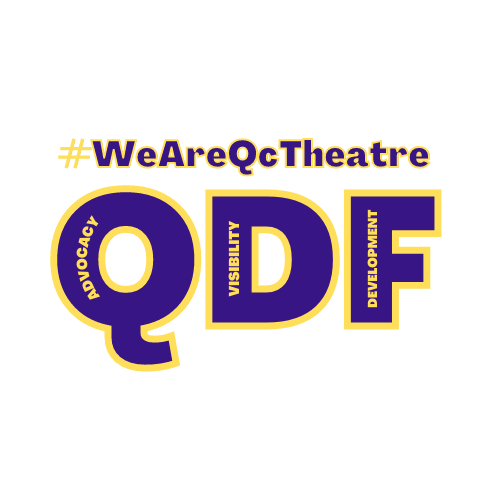A Homecoming Heroine; Ruth Madoc-Jones returns to the National Theatre School with Antigonick
By: Darragh Mondoux
Brecht, Beckett, and Sophocles walk into a bar, and order a solemn round with the English graduating class of the National Theatre School of Canada. Antigonick, Anne Carson's liberally translated pastiche-poetic tragedy of Sophokles will be directed by Ruth Madoc-Jones and performed at the Ludger-Duvernay Theatre at the Monument National from December 12th to the 16th.
Left: Ruth Madoc-Jones, Right: her NTS headshot from 1993
A distinguished graduate of the acting program, Madoc-Jones returns to NTS once more, having recently participated in the highly-publicized 30th Anniversary of the academy. Ruth will direct Antigonick with a guiding hand, guiding questions, and a guide in Carson, towards philosophers of art. Carson’s translations of this myth name Bertolt Brecht and Samuel Beckett, making room within the text for political motivation, as well as dark existential humour.
Speaking fondly of Montreal’s own multilingual performing arts scene, Ruth recalls the incredible “rigour, imagination and skill in French theatre” upon her first exposure to the city’s scene through NTS.While she attended amid the tensions of the second separation referendum, she felt “welcomed, it was so cosmopolitan, it was Montreal in the ‘90s!”
Of her cast, Ruth says that the text - in this case, the pastiche prose of this contemporary translation - must feel real to the performers in order to reach and move their audience. “The actor's job is internalizing the vocabulary, metaphor, rhyme,” that Carson’s translation prescribes. Both director and translator also being teachers with Montreal connections evokes a throughline to the upcoming production.
“I talked to the students about how this is just one iteration of this myth; Carson calls it the archives of grief,” says Ruth. “This is a myth that is told as an echo of its era.”
“Depending on the time and the culture [of any translation], the different characters are positioned as the hero or the antagonist, sometimes it’s Kreon and sometimes it’s Antigone.” Ruth teases that her vision has all the characters shaken, in fact traumatized by the war that has ended by the time the play begins; “Kreon’s edict is the most inhumane, he comes down hard.” This diametrically opposed conflict of political and family values personified right off the top of this show makes for great drama, and great philosophy. “She says ‘You are on the wrong side of history here,” likening Antigone more to a young social justice activist, than simply feminist by nature of her gender, “It has great potential to be a clarion call to stand up to authority, that you should be brave.”
The Creative and Production team of Antigonick.
Ruth hinted at the aesthetic vision for this show, delighting in the gender-fluid vision for costuming and character for roles such as Teresias and Antigone herself. Costumes by incumbent NTS design graduate Pen Tsin are sure to evoke the classical setting of ancient Thebes while complementing the modernity and neologisms of Carson’s translation.
The cast of Antigonick
“The Greeks didn’t ask ‘why’, they were more interested in ‘what’” Ruth explains, referring to the ancient audiences for whom performances of the Theban plays or the Oresteia would have been a cathartic rite, “What happens when these two forces are positioned against each other?”. We can only imagine what the audiences of ancient Greece would have experienced watching men in masks enact this tragic tale in the Athenian amphitheater, but Ruth’s interpretation for the student performance at the Ludger-Duvernay theatre with this novel translation is unbound to any one period of history.
“Despite the fact that women were not citizens, many Greek plays have these amazing women,” says Ruth of the gender politics found in classical drama, “When they wrote Medea they might have felt that they were seeing the worst character ever, ‘What a monster!’, but now that we understand her, we see her as totally human.”
Some say that every act of translation is an act of betrayal, while others say each is an act of adaptation. Poet and classicist Anne Carson takes this approach refreshingly liberally, betraying a feminist approach to the patriarchal traditions of translation, and adapting the original text to a continuous tradition of evolving meaning. Anachronisms, pop culture allusions, and humour yank the third of the Theban Plays out of the obscuring shadows of history. Preceding Madoc-Jones’ own experiences with the second referendum, Carson was a Montrealer during the tensions of the first referendum in the 1980’s. The budding translator must have had her own thoughts on the beautiful, linguistically troubled, cultural hub she found herself in. Her legacy has transcended contemporary poetry, academia, or literary prizes, being an idol of girls on Tumblr. The young aesthetes of the internet age will delight in vividly pinnable poetry of Antigonick.
Left: A visual excerpt from Carson’s An Oresteia translation, first published in 2009, with 14k notes on Tumblr, Right: photo of Carson by Peter Smith





